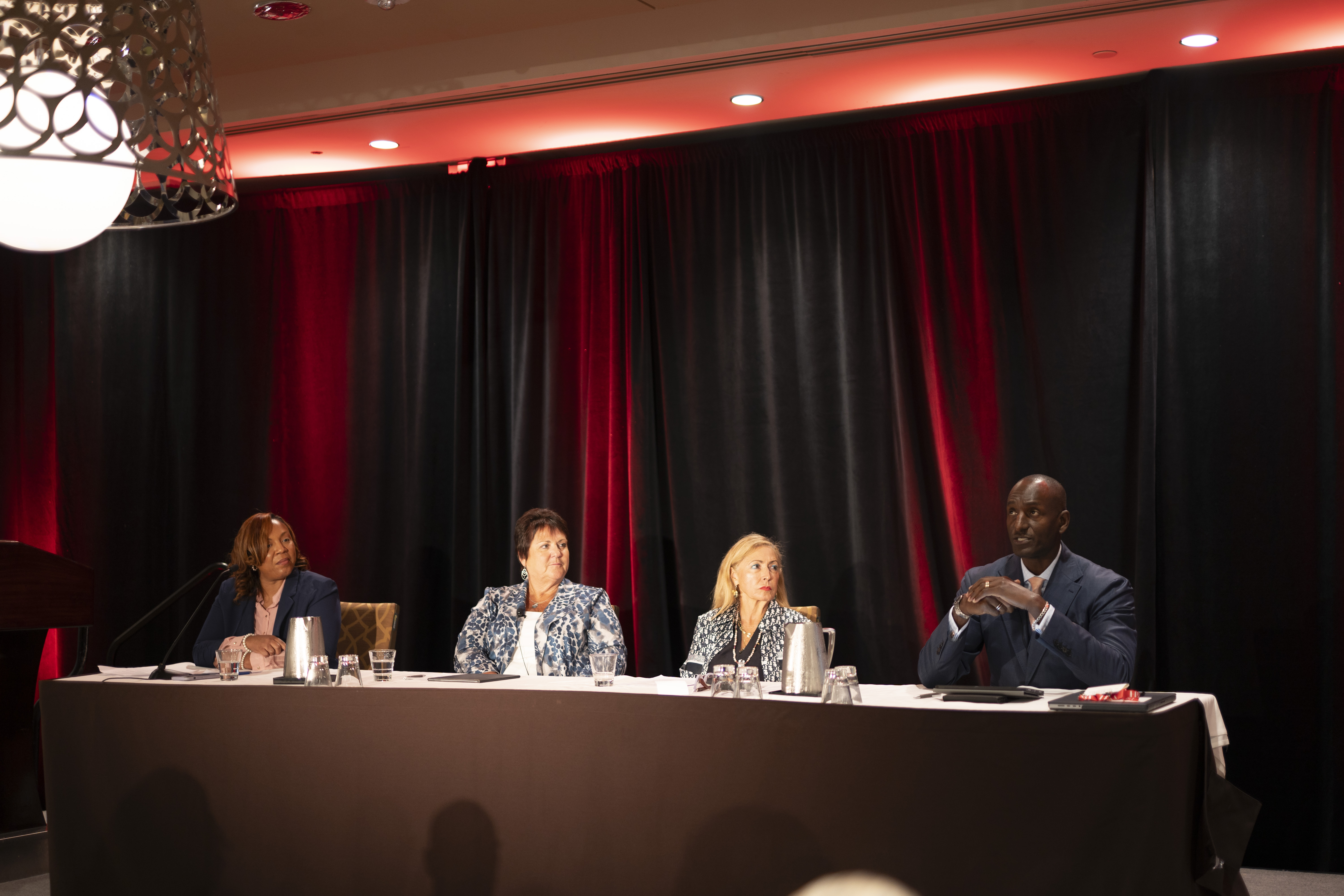Rewriting the Script for Change: Insights from the HBA Gender Equity Think Tank

At the 25th annual Healthcare Businesswomen's Association (HBA) Annual Conference in Toronto, a panel of experts gathered to discuss the evolving landscape of gender equity in the healthcare industry. The session, titled "Rewriting the Script for Change: Through a Think Tank Mindset," focused on the mission of the HBA's Gender Equity Think Tank, which aims to address systemic gender equities in the healthcare sector.
LaToya Tapscott, Senior Director & Global Head of the Gender Equity Think Tank and Susan Childs, Founder & Principal Managing Partner of LCA Consulting, co-moderated the panel. They were joined by industry leaders Dr. Randall Pinkett, Chairman & CEO of BCT Partners; Aida Sabo, SVP of DE&I at Parexel; and Julie Ross, President & CEO of Advanced Clinical. Together, they explored how the Think Tank is reshaping approaches to gender equity through collaboration, data-driven insights, and actionable strategies.
Fostering Collaboration to Drive Systemic Change
Previously named the Gender Parity Collaborative, the Gender Equity Think Tank was renamed and relaunched last year with a new focus on equity. While parity targets equal representation, equity allows us to understand more deeply the challenges facing women in the healthcare industry and create a plan to address the root causes of gender disparities. What are the challenges women are having in the workplace, and how can we address them head-on?
Panelist Julie Ross emphasized how the Think Tank has created a unique environment where even competitor companies come together to share best practices and learn from each other's experiences.
This collaborative spirit has led to concrete changes within member organizations. Both Aida Sabo and Ross shared how discussions within the Think Tank influenced their decision to create male allyship opportunities within their organizations to inspire tangible change.
“Men want to be part of the journey,” Sabo said. By creating safe, open spaces for men to understand and participate in bridging gender equity gaps, the Think Tank fosters a culture of shared responsibility and helps organizations break down silos and move toward collective action.
Leveraging Data to Uncover Insights and Drive Action
A central theme of the panel was the critical role of data in identifying and addressing gender disparities. Dr. Randall Pinkett emphasized the importance of using data to drive organizational change, breaking it down into three key areas: people, practices, and policies, or as he likes to call it, “the three P’s.” By looking at the three P’s, leaders can understand what kind of experiences women have in the workplace and where there might be gender equity gaps.
For example, Dr. Pinkett shared data from a Harvard Business Review study that found when there is only one woman in your candidate pool, there's statistically no chance she'll be hired. He elaborated, "When there was one woman in a panel of four interviewees, the likelihood of that woman being hired was 0%. When you increase that from one to two, two women out of four in the panel, it goes from 0% to 50%."
The data both highlights a problem and points to a concrete solution: By ensuring that multiple women are included in the hiring process, organizations can foster a more equitable outcome.
Developing Actionable Strategies to Overcome Barriers
Using data to drive organizational change is critical. The Think Tank plans to research and quantify the impact of current practices and test new strategies so that companies can make informed decisions that lead to equitable workplaces for women. But Think Tank leaders don’t want just any data – they want global data.
Partnering with member organizations worldwide, the Think Tank will research the factors affecting gender equity across different job levels, geographies, and roles within organizations – and how gender-based experiences might differ across different races, nationalities, religions, income levels, generations, and cultures.
The goal is to develop actionable, evidence-based strategies that organizations can implement to break down barriers to gender equity.
For example, Saba shared that at Parexel there were plenty of women in lower management positions, but few at the executive level.
“Women were disappearing from leadership pipelines, and we needed to change that,” Sabo said. Using insights from the Think Tank, Sabo developed and implemented targeted leadership programs to support women’s advancement and track the career progress of women of color. Now, 47% of Parexel's senior leadership is female, thanks to these intentional efforts.
Beyond the Gender Equity Think Tank
"The Gender Equity Think Tank is more than a think tank. It's a DO tank,” shared LaToya Tapscott. “We're really here to drive action and deliver measurable results.”
It’s also a growing think tank and is expanding its focus areas to include health and wellness of women in the workplace, financial acumen, and amplifying the voices of women of color. The new and expanded Think Tank’s repository of data, insights, and solutions will be available to the entire healthcare industry, not just Gender Equity Think Tank members.
Dr. Pinkett closed the panel with a quote from American novelist and non-fiction writer Anne Lamont: “We are not here to see through each other, but to see each other through.” Originally written about her first year of motherhood, the sentiment also captures the essence of the Think Tank’s mission: to foster a supportive, collaborative environment in the healthcare industry where organizations uplift and empower one another to overcome gender equity disparities.
As the healthcare industry – and world – continues to grapple with gender equity challenges, initiatives like the HBA's Gender Equity Think Tank offers a blueprint for collaborative, data-driven approaches to creating more inclusive and equitable workplaces. By bringing together diverse perspectives, leveraging global insights, and developing actionable strategies, the Think Tank is indeed rewriting the script for how organizations approach gender equity.
Want to help rewrite the script for change? Email GETT@hbanet.org and see how your organization can get involved!